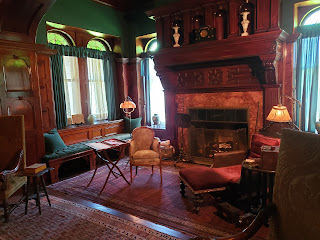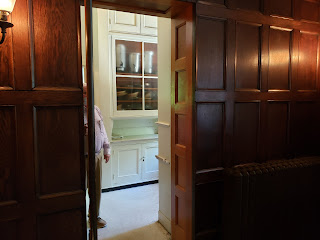I've taken a couple of false starts on the new book. Starting with a lot of boring detail and unnecessary backstory. That's usually the way. Then I cut the detail so the action would be more immediate, but even that wasn't working right. First chapters are always a challenge. As an author, I need to grab your attention from the get-go. But I still had research to do, and until I was able to get out and do that, I kept writing so at least I'd have something to fix.
And then I got out for research.
I went out to meet people last Friday, to find out how people in the occupation my main character works do their jobs. It took me three stops to find someone who is now my best friend.
My first stop was a "market," an indoor venue with approximately 35 booths, and when I walked in, the ladies at the door seemed uncertain as to how they could help me. So they said to walk through and talk to the people at the booths that had merchandise I was researching. The only problem with that was there were very few vendors actually at their booths, and certainly none at the booths that were relevant to my story. Halfway through the market, I ran across another woman who was very pleasant and asked if I had planned a visit to a shop "downtown." When I told her yes, she told me that was a great idea and the woman in the shop would be very helpful. As opposed to the 35 booths that weren't. The stop did reinforce one thing. Narrow my focus. Instead of a very broad vendor, I'd be wiser to have my main character specialize in one area.
My second stop was a shop "downtown." I walked in after visiting the Farmers' Market, mid-afternoon, and the proprietor was just having lunch. She had a consignor with her and they were in conversation. She greeted me, but I felt like I was intruding, so I told her I'd just look around and stop with questions after I'd seen what she had. The store was sprawling--unique and interesting--but there was also a store next door. After I'd looked at her inventory, probably fifteen minutes later, she was still eating and still had the consignor at the counter with her. I asked her a few general questions, then moved on to the next shop. Dear husband was with me and growing impatient that I hadn't said much. I pointed out she was clearly distracted and not forthcoming or interested in conversation at the moment. I steered DH to the next shop with the intention of circling back. Maybe the guy at the counter would be gone by then, at least.
In the next shop, Whatnots and Whimsies, I found a very friendly proprietor (shout out to Fran), and as we started to talk, the consignor from the previous shop walked in with a box of things to sell. I tried to excuse myself to give her time to deal with him and said I'd look around, and she said, "No, stay and talk to me! This is just a regular seller, blah blah blah." But I felt I was intruding, so I said I'd come back after I'd seen what she had. Again, she had a lot of interesting inventory, including some of the things that I'd targeted for my character. After we'd toured the store and neared the front, she stopped me and said, "Go ahead, pick my brain." With the consignor at the counter and customers in the store. I asked a few wide-ranging questions and she steered me back in and asked what the project is about. When I told her, her eyes brightened and she said, "Have I got stories for you." I spent the next hour talking to her, with customers stopping to join in the conversation and one of the employees as eager to chat as she was.
I'm not a very pushy person (as you might have surmised), so this woman's willingness to draw me in despite her outside distractions appealed to me, as well as the stories she told me... Let me just say I found my new starting point in the manuscript. Am I using her stories? Not as a main theme, but perhaps I might incorporate one or two in the "work history" part of the book, as my character goes about her job. In talking, she helped me organize my own ideas into a more cohesive structure, taking what I have and weaving it into a more compelling start to the book - or so I hope.
I have the perfect reference for my new series. This woman could well BE my main character, except, of course, the facts don't always fit the stories. There's quite a bit of "made it up along the way" to deal with.
Sometimes doing the research is as much or more fun that writing. Can't wait to share the new series with you.
In the meantime, editor comments are back on BEING NEIGHBORLY, so need to knock that out to make sure it's on time for release day. (Don't forget, you can buy it at a discount, but only until July 13th).



.jpg)






